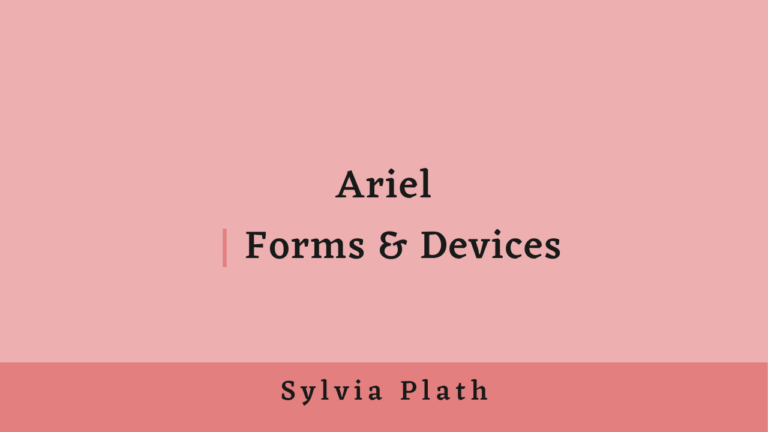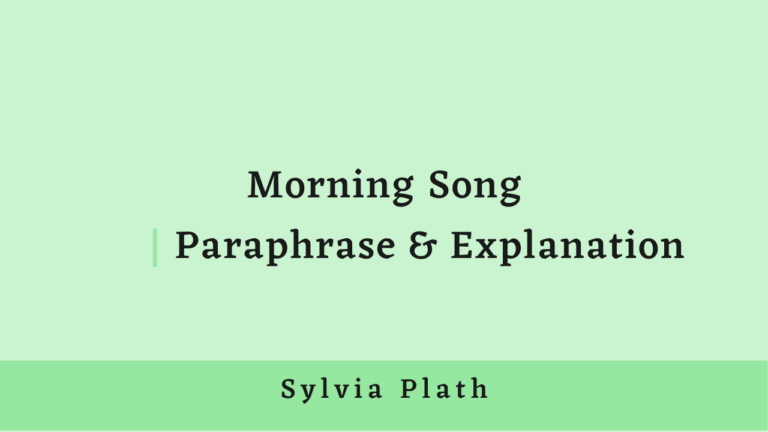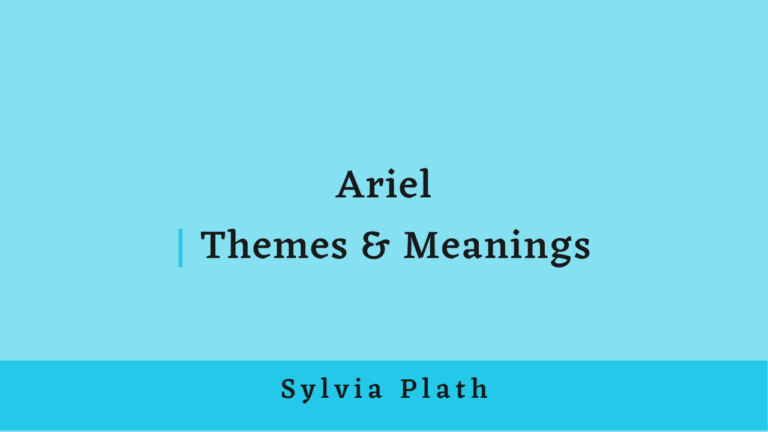“Morning Song” was written by the influential 20th century American poet Sylvia Plath in 1961 recently after giving birth to her daughter Frieda. The poem depicts Plath’s uncertainty and admiration in the face of this new life. Plath’s ability to transform her personal experience into universal acceptance using imagery, metaphor, simile, juxtaposition and the style of surrealism.
“I saw the gooseflesh on my skin. I did not know what made it. I was not cold. Had a ghost passed over? No, it was the poetry.” – Sylvia Plath

The poem begins with a sense of indifference, uncertainty and doubt. The complexity of new motherhood is reflected with the changing emotions of the new mother. There is a frequent shift in the mood of a mother first in the form of unfamiliarity and alienation to intimacy and nurturing at the end of the poem.
The opening lines, “Love set you going like a fat gold watch,” use an unusual metaphor to describe the newborn. The comparison of the baby to a “fat gold watch” suggests both preciousness and mechanical detachment. The speaker’s tone is one of observation rather than emotional attachment. The use of the word “watch” implies a clinical, almost dispassionate view of the newborn, highlighting the initial distance the speaker feels.
In the early stanzas, the speaker continues to express the feelings of alienation and newness. The baby is described as a “new statue / In a drafty museum,” emphasizing the sense of the child as an object to be observed rather than an integrated part of the speaker’s life. The image of a statue in a museum conveys a cold, impersonal atmosphere, highlighting the speaker’s initial struggle to connect emotionally with the newborn.
As the poem progresses, the speaker’s mode begins to shift toward acceptance and bonding. The tone becomes more tender and introspective. For instance, the line “I’m no more your mother / Than the cloud that distills a mirror to reflect its own slow / Effacement at the wind’s hand” reflects the speaker’s contemplation of her role and identity as a mother. This metaphor suggests a process of self-reflection and gradual acceptance of her new identity.
In the later stanzas, the speaker’s mode shifts to one of nurturing and tenderness. The imagery becomes more intimate, as seen in the lines “All night your moth-breath / Flickers among the flat pink roses.” The comparison of the baby’s breath to a “moth-breath” and the “flat pink roses” evokes a sense of delicacy and fragility, highlighting the speaker’s growing protective instincts and emotional connection to the child.
The poem concludes with a tone of hope and affirmation. The final lines, “The clear vowels rise like balloons,” capture the joyful and uplifting sound of the baby’s voice. The simile of vowels rising like balloons suggests a sense of release and freedom, signifying the speaker’s acceptance and celebration of the new life. The speaker’s mode has shifted from detachment and ambivalence to one of joy, connection, and affirmation.
The shifting mode of the speaker in “Morning Song” mirrors the emotional journey of a new mother. From initial detachment and ambivalence to gradual acceptance and bonding, the poem captures the complex and evolving emotions associated with motherhood. Plath’s use of vivid imagery and shifting tones allows readers to experience the transformative power of new life through the eyes of the speaker.
Morning Song
BY SYLVIA PLATH
Love set you going like a fat gold watch. The midwife slapped your footsoles, and your bald cry Took its place among the elements. Our voices echo, magnifying your arrival. New statue. In a drafty museum, your nakedness Shadows our safety. We stand round blankly as walls. I’m no more your mother Than the cloud that distills a mirror to reflect its own slow Effacement at the wind’s hand. All night your moth-breath Flickers among the flat pink roses. I wake to listen: A far sea moves in my ear. One cry, and I stumble from bed, cow-heavy and floral In my Victorian nightgown. Your mouth opens clean as a cat’s. The window square Whitens and swallows its dull stars. And now you try Your handful of notes; The clear vowels rise like balloons.






